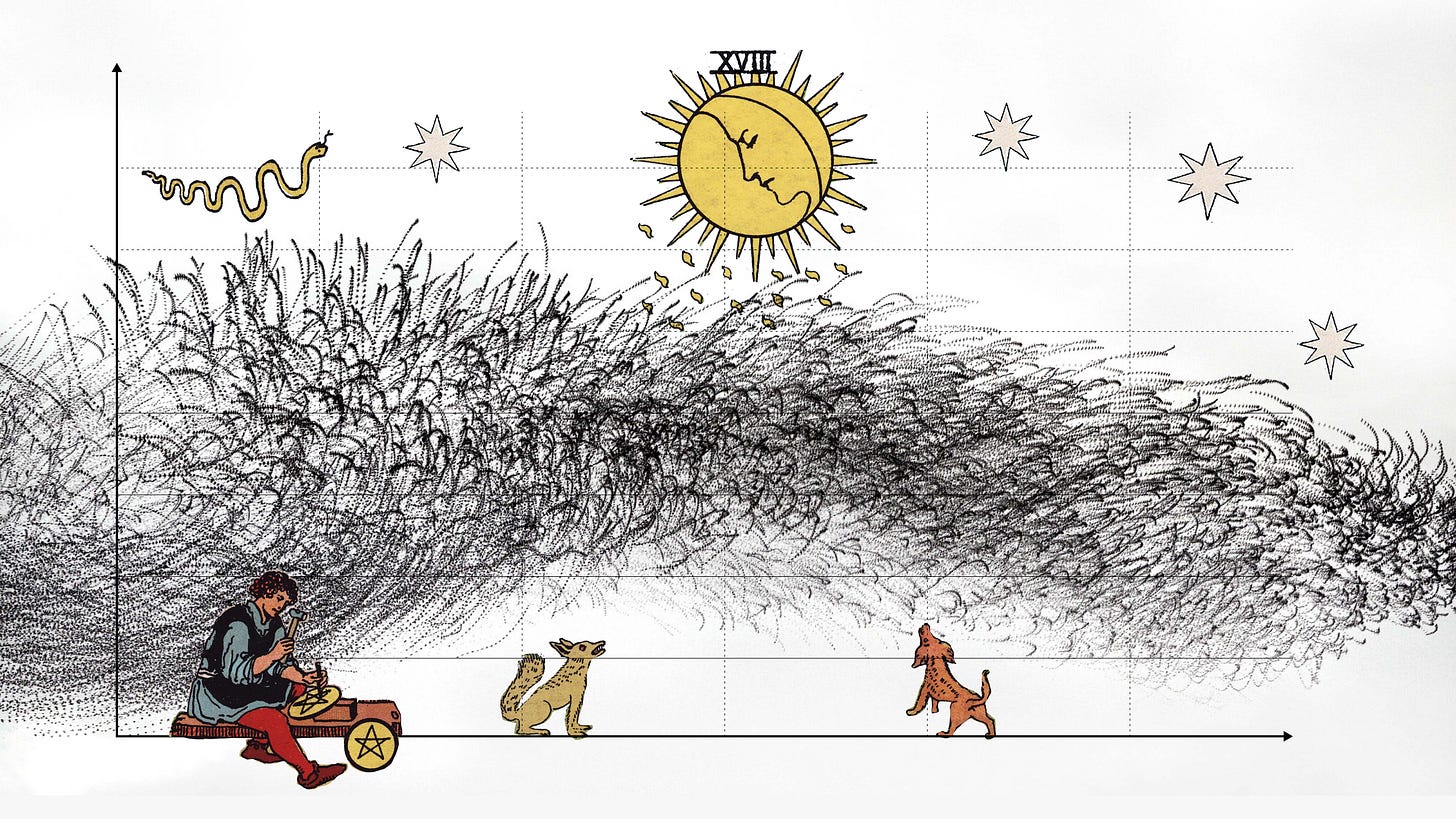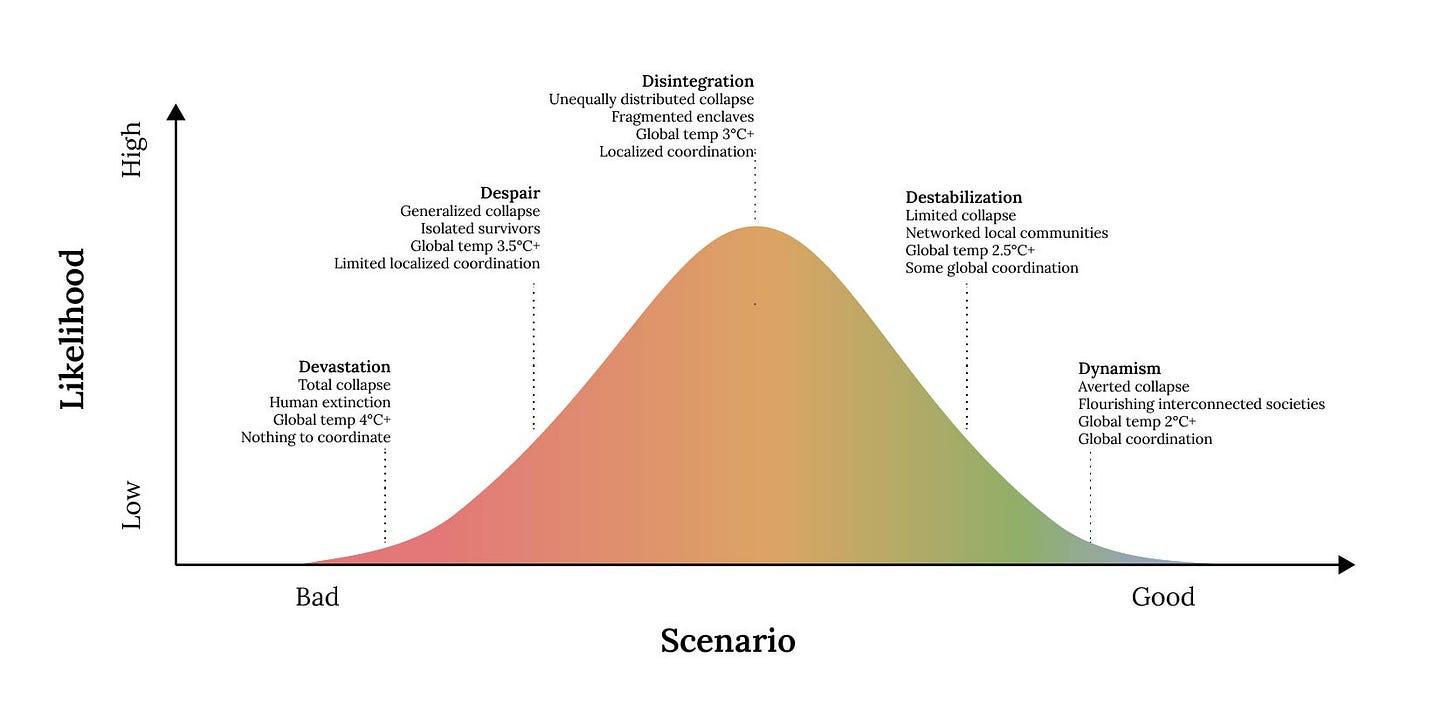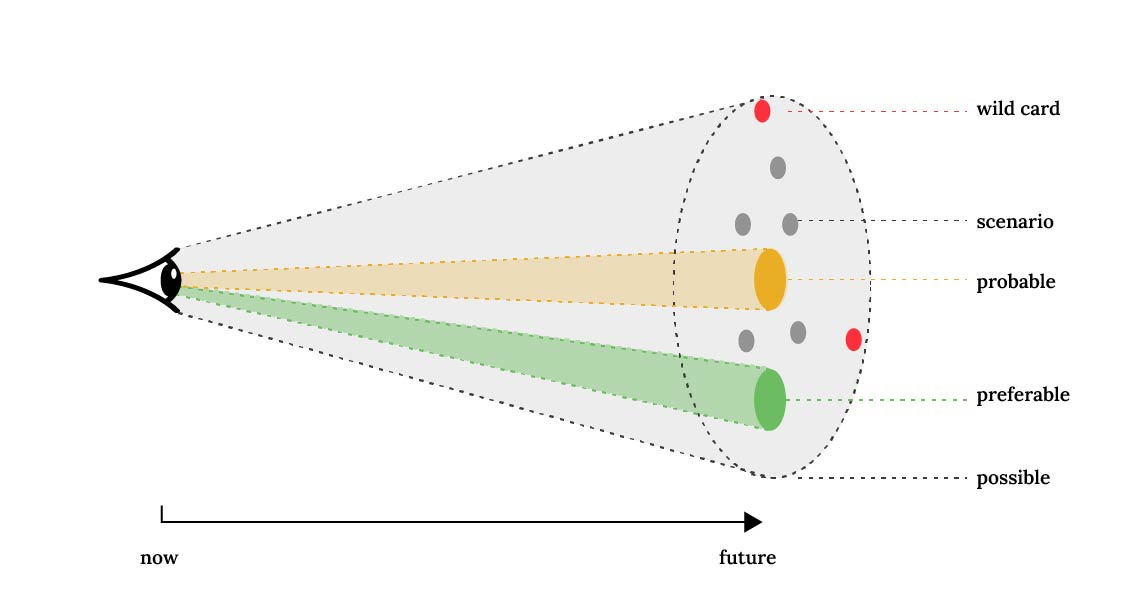
| From prediction to participation |
When change comes fast and the world is in upheaval and the machine, bursting at the seams, charges blindly on, it’s only normal to cling to some sense of certainty. Our anxious hearts turn to the soothsayers and fortune tellers for help, asking questions like, when will the markets fail and the planes stop flying? When and how will AGI arrive? When will, you know, shit hit the fan?
I wonder about these questions all the fucking time, and others too it seems: a 2023 survey found that one third of American adults were prepping for a doomsday scenario. Individuals I look up to tell me that rapid-onset collapse will take place in six months, or two years, or not at all. Their voices carry the weight of knowledge, the allure of one-in-the-know.
Recently, a team of AI forecasters - five white American bros - published AI 2027, a meticulously researched projection of AIs potential evolution over the next two years. Extrapolating from trends in computing capacity, their analysis traces two possible scenarios - accelerated AI deployment and strategic containment - which you can explore via a sleek, quarter-by-quarter, interactive timeline. Science fiction used to travel hundreds of years ahead to imagine different universes; now, it seems we only need two.
To be honest, I am tired of the predictions and scenario planning. It’s not that I don’t believe in probabilities - clearly some scenarios are more likely than others - but that all the prognostication is, well, boring. Like the LLMs powering the AI systems turbocharging modernity, prediction is always an exercise in extrapolation from a narrow slice of past data. It carries the past into the future. It leaves no room for surprise or divine grace.
Predictive thinking, in short, lacks creativity. Anyone who has spent a few hours studying complex systems - a cell, a weather pattern, the human body - knows that although we can model these systems, we cannot fully predict them. You don’t need a PhD in statistics to recognize this. Relying on prediction is also an addicting maneuver to absolve ourselves from our responsibility to participate in the challenges of the world. It avoids a more fundamental space of inquiry that includes questions like: how can I be with and care for a living, open-ended cosmos? What capacities must I cultivate to participate in this emergence? And who do I want to be in this process?
These are not questions about what will happen. They are questions about how to be in a relationship with what is happening. They foreground presence over probability distributions; courage over calculations. In short, participation over prediction.
We live in a world scintillating with intelligence and animacy, where every thread of connection - between one self, other humans, and the more-than-human - creates emergent possibilities that cannot be predicted. This is why most traditional divination practices - whether tarot readings, cowry shells, or the I Ching - don’t predict outcomes; they invite a dialogue between ourselves and the larger, archetypal patterns we are immersed in, with all their terrible beauty and possibility.
Don’t get me wrong: I am curious about collapse scenarios, and I do think predictive thinking can help us make informed decisions. But I am thirsty for the insights that cannot be modeled, for the flashes of lightning in the summer sky, the feather that lands on the path, and the new friend who shows up unbidden and unimagined. I want to cultivate the universe as a wild and sovereign being.
| From control to emergence |
Like the colonial mindset that sought to master natural worlds and human societies, the predictive mindset stems from a desire to control rather than belong. Historically, control was needed to establish trade monopolies and extract resources without local opposition. It lives on today in our state surveillance systems, the engagement-optimization algorithms of social media, and the trade policies that maintain geopolitical hierarchies. Less obvious, the paradigm of control drip feeds into our psyches, creating the illusion that we are separate individuals who must strategize and compete to secure our futures in an unfriendly reality.
One definition of privilege is not needing to build relationships with others because you can meet all your needs through paid services or coercion. Through the perspective of relationship, we can see the metacrisis as the inevitable outcome of progressive atomization, or fragmentation, of human societies: the ecological crisis the inevitable outcome of seeing ourselves as separate from nature rather than enmeshed within it; political polarization the inability to recognize our shared humanity across differences; climate change a broken contract between generations; depression and anxiety the disconnection from our bodies, our communities, and the rhythms that once created sacred containers for the human experience.
In each case, the remedy is not better prediction or tighter control; it is mending the torn fabric, recognizing and cultivating community and kinship with everything that we depend on. This isn’t spiritual psychobabble; it’s actually quite practical. Research consistently shows that in disasters—from hurricanes to heatwaves—the strongest predictor of survival isn't individual preparedness but social cohesion. Communities with strong relationships adapt creatively to whatever unfolds, without needing perfect foresight. If your neighbors don’t know you, they won’t check on you in times of need, and the reality is that modern consumer society - from its cars, highways, and efficient supply chains, to its longevity biohacking protocols - is still designed to optimize for individual self-optimization, not mutual interdependence.
Think of a murmuration of starlings, or an ant colony, or two dancers in a flow state. Each share simple principles of attunement that form breathtaking patterns. Prediction models repeatedly fail in complex systems because they cannot account for all the interaction between parts. This is why ecological tipping points make it impossible to predict the future of climate on our planet.
For those concerned about where to dedicate their time and life energy amidst collapse, I have an idea: follow the starlings, talk to your neighbors. It’s not just a prudent disaster strategy. Relationships form the bedrock of our ability to act in this world. What is impossible for you is possible for us. So leave the bunkers behind, and start the block parties.
| Beyond the Bell Curve |
This exploration began with an altogether different question, sparked by Tristan Harris's recent TED talk: can an honest collective reckoning with probable futures alter those very probabilities? We have massive challenges as a species, but we shoot ourselves in the foot by denying they exist. What happens when we get honest about the trajectory we are currently on, ie what is likely to happen?
A fan of visualizations to capture the essence of a question, I decided to represent the likelihood of different future scenarios as well as the relationship between the probable, the possible, and the preferable. It was ultimately a frustrating process. There are too many tipping points and unknowns, and the wild card that is AI made the bell curve pointless. Every point on the curve might as well have been labeled ± infinity.
For a technology built on prediction, AI, in its current form, is paradoxically making the future less predictable. It doesn’t enhance emergence: it short-circuits it by compressing timelines while simultaneously homogenizing inputs and outputs through standardized algorithms and training data.
Psychedelics have been described as “non-specific amplifiers,” intensifying whatever thoughts, emotions, or psychological material is present in the mind, making them more vivid and significant regardless of their specific content. AI plays a similar role for modernity, intensifying speed, efficiency, and homogenization over organic growth, friction, and diversity. What emerges is a particularly pernicious form of unpredictability: not the rich, creative open-endedness of natural systems, but the chaotic instability of accelerated change without the wisdom of evolutionary timescales.
| A Participatory Cosmos |
What if, instead of extrapolation-based predictions that lock us into perverse dynamics, we looked to ancient divination practices for different ways of relating to the future? Practices like the I Ching and tarot present symbolic systems that invite non-linear association-making, allowing our body to access insights that might remain inaccessible through direct logical inquiry alone. They help us access modes of knowing that operate beyond analytical and predictive thinking, such as the capacity to embrace uncertainty and paradox rather than control it. The agency that emerges isn't the false security of control. It’s the freedom to choose the qualities we want to cultivate in relationship with existential uncertainty.
There is a passage in Carl Jung’s autobiography when he describes meeting a Pueblo elder in Taos in 1925. Watching the sunrise together, the elder explains to Jung that the Pueblo pray to help the sun cross the sky every day and Jung later writes that, from a modern Western perspective, this is ridiculous: the sun crosses the sky whether we like it or not. But Jung also had the wisdom to understand that a cosmos in which stars need our support was also one that we could love and care for.
The universe is a participatory place, constantly in the frothy, sloshy throes of creation by active forces: wind currents and magnetic fields, wings and paws, spores and pollen, decomposers and acidifiers, hoarders and sharers, by yelping, flapping and hissing ones. And, possibly, by you too. Never in isolation, but as obligate denizens of a broader ecosystem. Our role as human beings today is not to control and solve problems. It is to be present with them, to wrestle with them, and to emerge unpredictably altered on the other side.
EXERCISE: If you are interested in exploring participation and emergence - not necessarily in opposition to prediction and control, but certainly as a foundation to them - here are some questions and practices you might want to consider:
What natural systems or cycles (seasons, tides, day/night) do you already participate in without conscious effort? How might acknowledging this participation shift how much “you” are doing? Place one hand on your heart and one on your belly. Feel your breath moving without your conscious control. Simply notice how your body already knows how to participate in the flow of life.
What are you trying to predict or control in your life right now? Can you identify one area where letting go of the need to know might actually create more possibilities? Holding an intention or a question, draw a tarot card or open a book to a random page. Rather than seeking a specific answer, notice what associations, images, or feelings arise. How is relating to that experience different from attempting to find an answer?
What surprising encounters or synchronicities have recently appeared in your life? How might these unplanned connections be inviting you into new ways of being or perceiving? Sit or stand in one place for some minutes and simply observe what emerges around you—sounds, movements, thoughts. Notice how much complexity exists without your intervention.
In this time of profound change, what qualities do you want to embody regardless of what outcomes unfold? How might cultivating these qualities be a form of agency itself? Stand with your feet shoulder - width apart, knees slightly bent. Gently sway like a tree in the wind, neither rigid nor collapsing. Feel what it's like to be both rooted whilst still responsive to forces larger than yourself.






Hi Andy. That sounds like such an inspiring curriculum. What age group is it for? Maybe you've come across the work of Phoebe Tickell - she also does good work on the multi-species, cross generation, cross-cultural.
Thanks for the time and care put into articulating this 🙏
The ritual of popping your head over the fence for a yarn with your neighbour, saying hello and stopping for yarn on the street. Engaging with your local public school parents and citizens association. Creating the conditions to commune, and syncing with the moon to see beyond the doom of what is being revealed in this apocalypse.
The future is not written. It is crafted through small rituals and practices to re/cognise our relationship with self, each other and the web of life we are part of.